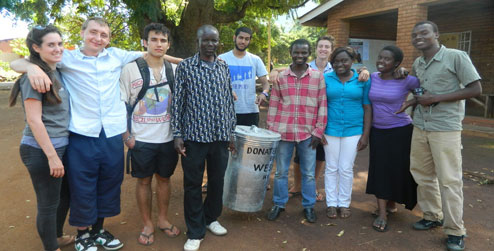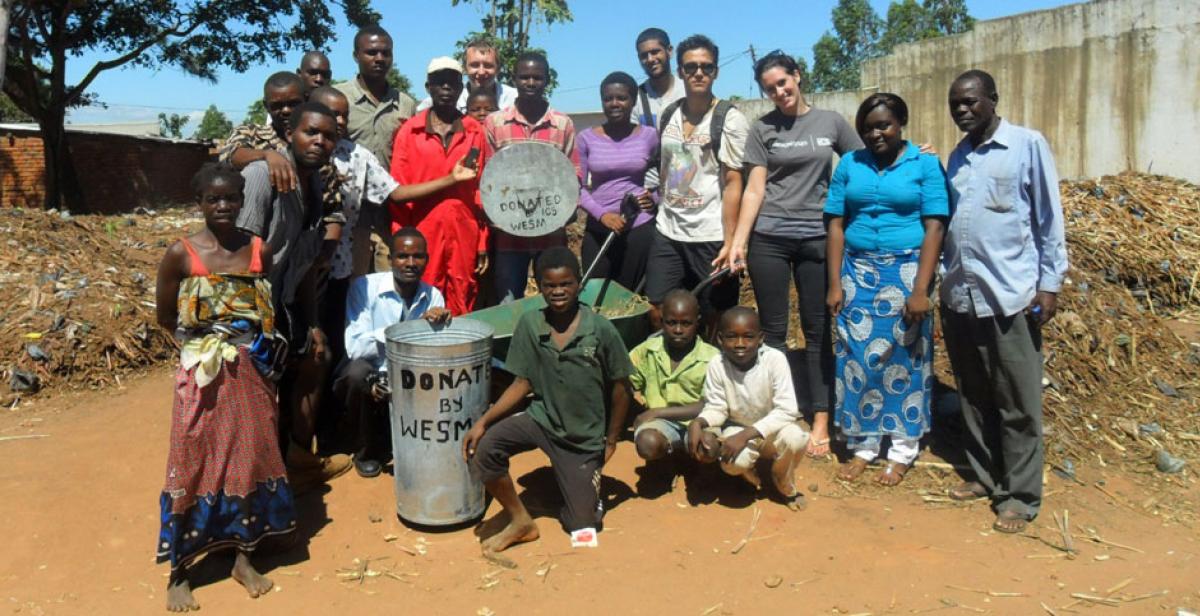Waste is a growing problem throughout the world, threatening wildlife and the health of many human beings, not to mention the decaying of its natural beauty. Team Sapitwa have been tackling the problem of waste in the Mulanje district of Malawi. Malawians are very house proud so the homes and gardens of the local populous are very clean. The problem is many Malawians don’t bin their waste a lot of the time. You can even see people sweeping rubbish from their front gardens onto the streets, which only adds to the problem. The biggest problem facing us today is educating people on why waste should be managed correctly and why it is important. To confront this problem team Sapitwa are hosting awareness campaigns and have started distributing waste bins to local Mulanje markets. The theory is that if we can get people to take an interest in the management of waste, more people will talk about this issue and won’t just stand by when they see someone throw rubbish on the floor. In the UK there are fines for people who are seen littering. If we can also show people what other countries are doing in order to tackle the problem, maybe in the future new innovation of waste management will come fourth, such as recycling.
So why is waste a problem?
The main harm to the environment lies not in managing waste ineffectively, but in the dumping of plastics such as plastic bags. These are not biodegradable, so they reside in the place they were dumped for years which can impact the environment in several ways. Firstly, the plastics attract pests such as rats and other smaller creatures, making the area extremely unhygienic. Secondly when plastics are left in the open, rain can cause the plastics to release chemicals into the soil which infiltrate into the streams and rivers, causing the clean and fresh water to turn into a threatening mix of chemicals. Water from Mount Mulanje is utilised by many Malawians and so this is directly, albeit slowly, affecting the health of the Mulanje population. Waste also harms the prospect of tourism; ultimately waste is an eye sore and it promotes the idea that the community does not care about their own environment. Mulanje does not get much tourism, apart from people coming to climb Mulanje Mountain and this is a potential detractor for potential tourists.
Distribution of waste bins in Mulanje
Team Sapitwa have been distributing waste bins around Mulanje markets. The need for these bins and other waste management equipment in the markets, had been identified through a survey which was conducted by the previous Sapitwa team, with the help of the city council.
Following in their footsteps, we have been able to distribute waste bins to some of the markets, which so far have been Lauderdale, Chinakanaka, Chitakale and Boma. The funds for these bins were kindly donated by Wildlife and Environmental Society of Malawi (WESM ). Team Sapitwa still has a target of 11 more waste bins to distribute, however it takes the manufacturers 2 days to make 4 waste bins, so by the end of the placement the team hope to have met their target of distributing 15 waste bins!
How waste is managed in Mulanje markets
Usually in Malawian markets, a hole/pit is dug where the local community would dump all of its garbage and waste. When the pit is full, the city council would come in with a truck and collect the waste, as to move it to a place which is designated for waste. Over the years, this has been the trend in how waste is managed in the markets and overtime this has coincided with a lack of resources. In result, it has been quite a challenge to collect all the garbage and the waste piles up dramatically.
To fight this challenge of waste pilling up, some markets like Chinakanaka market, have committees that facilitate the removal of the waste to another place which was given by the chief. At this place people are given the chance to use the waste as compost manure in their maize field. But some waste is left unattended, since the waste contains some non-bio-degradable materials like plastics, grass and other materials.
As the team progress through their placement, they hope to revisit these markets that receive the donations, to ensure the corrective use of the waste bins. The team is exited to potentially hold an awareness campaign, where they would ask every individual to pick up a piece of litter to encourage communal team work. Keep posted to read on the developments of team Sapitwa.

Team Sapitwa at Boma market
Written by Andrew and Harry
Photography: Hesham and Gift



